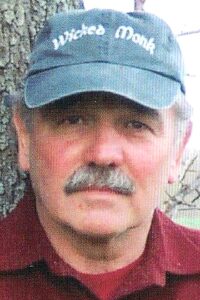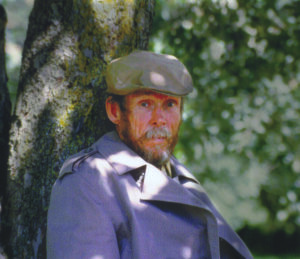Life Sketches
Remembering the sad
story of a Soviet Prisoner

He sat under the apple trees at Holy Trinity Monastery outside of Jordanville as the warm breeze lifted the thin pages of the book he was holding. Lush foliage seemed to exude an abundance of life. Church bells marked the time of day, but he didn’t appear to notice as his thin, intent face strained to absorb the words. The thick book he was reading was nearly turned to its end, giving the impression that many afternoons had been spent like this with many books before, but this was not the case.
Sixty-two year old Vasili Shipilov had spent most of his life behind Soviet prison bars.
His crime, officials said, was not carrying proper identification papers, for which he received two years hard labor. From information obtained from men who had served time with Vasili, it was believed that he was a priest who had gotten his early education from monks who had taught him to read. Free world newsletters about religious prisoners in Russia said that Shipilov had suffered greatly in the prison camps. He was reputed to have performed baptisms as a prisoner, and for this he was beaten and his sentence increased. When he got hold of a bible he copied it over by hand so that others could share it. To side track his efforts, in 1958, he was sent to a mental institution and detained there indefinitely. He had no living relatives, no one to remind the world of his existence.

In 1978, almost twenty years later, Reverend Dick Rogers of Birmingham, England learned of Shipilov’s plight from Russian emigres. Rogers worked unsuccessfully for nine years trying to win Shipilov’s freedom.
Then, before the Reagan-Gorbachev summit in December 1987, the Soviet delegation declared that Vasili Shipilov was one of the religious prisoners who would not be released. To pressure the Soviets and make this incredible imprisonment known to the world, Rogers went on a forty-six day hunger strike while locked up in a cage-like cell in a church in London.
People from all over the world visited the church to talk with the reverend during his self imposed incarceration. Pressured by Rogers’ campaign, the Soviets moved Shipilov from a remote insane asylum in Siberia to a psychiatric hospital in the city of Krasnoyask.
Three months later, Rogers learned that Shipilov had been moved to Moscow and was being readied with a visa for England. The reverend went to Moscow to aid with the paper work and accompany Shipilov on the trip to Great Britain.

A few days after his release, there was a press conference in Moscow at which Soviet officials tried to cast Shipilov as a derelict, imposter and a schizophrenic. The reverend interpreted their claims as efforts to deflate the triumph of Shipilov’s release. It was at this time that Rogers learned that Vasili was not a priest. This disclosure gave the debasing Soviet claims more credibility.
Rogers said that even though Shipilov was not a priest, winning his freedom was no less worthwhile. He said that the years of imprisonment and forced subjection to drugs had taken their toll, but Shipilov, contrary to Soviet claims, was not insane.
They departed on a French plane bound for London and then, without a stopover, continued on to America arriving at Newark Airport where monks from Holy Trinity Monastery, who had been in touch with Reverend Rogers, were waiting to take Vasili back to Jordanville. Rogers returned to England.
At the monastery, Shipilov was silent, suspicious and deeply withdrawn. For the first week he didn’t come out of his room. Later, a seminarian assigned to spend time with him said that Vasili had told him, “I’ve been living in a dark closet and suddenly I’m blinded by the light.”
Often it appeared that Vasili was not yet aware he was free. He paced under the apple trees beside the church for a short distance, dragging one foot and then turned as though he were still in a cell.
Speaking very little and only in Russian, his eyes seemed clouded and unaware, but he read a lot and wrote letters to Reverend Rogers in England.
A year later, Shipilov was clearer and stronger and eager to set the record straight. He wanted to write a book about his ordeal. Inaccuracies in his history seemed to have undermined his credibility enough to make the world almost ignore his release. Shipilov said the Soviets distorted the facts to justify his prolonged captivity. He didn’t make himself out to be a hero. “My father was born a farmer but worked as a warehouseman for the collective community. All the best farmers were stripped of their wealth and sent there. My mother became a milkmaid.” Vasili learned about pre-revolutionary Russia from his grandfather, who had talked of his own farm and a good life in Belo-Onvi in western Siberia, where there was plenty of everything to go around.
Shipilov’s father was called to the army during the Second World War and sent to fight the Germans. His mother died not long after that. As a teenager, he found himself homeless and on his own.
He wandered through the countryside looking for food and shelter. “People treated me like a stray cat, shooing me away from their doorsteps.” He lived like this for several years, until in 1949, he was arrested for not having papers and was sentenced to two years in a work camp.
“It wasn’t bad; there was food and a place to sleep,” he said. “I loaded and unloaded trucks and cleaned the ovens in a brick factory, a filthy job that made you spit black for a week.”
After two years, he was released and issued papers, which he threw away directly.
“It was a matter of principal not to carry Soviet papers,” he said.
He was in and out of work camps for about 10 years. Food was scarce. Sometimes survival meant being placed in a camp.
In 1958, he was serving what seemed like an extremely long sentence in central Siberia for the same old “crime” of not having papers. His fellow inmates were the worst kind of thieves and murderers, he said. He had written several letters asking the government to release him but got no answer. Finally, out of frustration he wrote to the Soviet president saying, “All Communists should be hanged.”
From that time on Shipilov was considered a dangerous enemy of the state. He was transferred to Sychovka Hospital in the Smolensk region, one of several psychiatric hospitals that detained him for almost 30 years. It was in these institutions that Vasili’s real suffering began. At Sychovka, they repeatedly administered mind-bending drugs that caused excruciating pain. After awhile, he began to have seizures. When he rebelled by refusing to work, male nurses who were actually inmates took him to the basement, stripped him of his clothes and beat him. One of Vasili’s knees was broken. “We were walking to the bathhouse to take showers and I wasn’t feeling well and I sat down on a tree stump to rest. A male nurse told me to get up and walk. I tried, but when I couldn’t, he kicked me in the knee in a way that it doesn’t bend and that’s how it’s been ever since, broken.”
Father Roman Krassovsky, an administrator at Holy Trinity Monastery, said, “Vasili has amazing spirit and faith and in his own way he is a deeply devout man. He seems to fit the
old adage, ‘You can destroy a man but you can’t defeat him.’”
Ironically, Shipilov didn’t trust his new freedom. He was bound to the monastery with no mobility and little knowledge of the modern world. It appeared he was as alone as ever. The pain of the beatings was still with him. He couldn’t bend to tie a shoelace. He hid his food, and when taking meals with the monks, he’d often slip a piece of bread into his pocket, though there was ample food on the table. He didn’t pray in unison with the monks but seemed to face an altar he saw in his mind. When finished praying he crossed himself hard.
“If I had but one wish,” Vasili told a visitor, “I would like to be back in Russia on the farm that my grandfather described to me.”
Rogers felt the Soviets, to a large degree, had succeeded in squelching the triumph of Vasili’s release by discrediting him. The free world didn’t embrace this mere man as it would have a clergyman. Rogers’ hunger strike surely had gotten more publicity than Vasili’s release. As in the past, Shipilov remained alone and almost forgotten. His life hadn’t changed much. He had no money and few possessions. He still occupied a cell, only this time it was at a monastery.
Shipilov died of a cerebral hemorrhage Aug. 16, 1993. He was buried in the cemetery at Holy Trinity Monastery, not far from the apple trees he used to sit under while reading.

